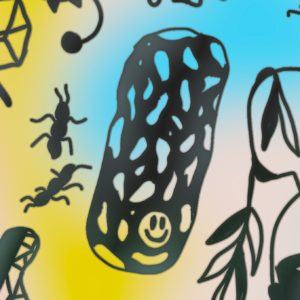Hello Tempeh!
| Hello Tempeh! | |
|---|---|
| Name | Hello Tempeh! |
| Location | Het Wilde Weg |
| Date | 2024/07/19-2024/07/22 |
| Time | [[]] |
| PeopleOrganisations | Loes Bogers |
| Type | HDSC2024 |
| Web | Yes |
| No | |
In this workshop, participants will learn how to grow fresh tempeh: a traditional Indonesian food made from fermented soybeans. Making tempeh together involves hands-on everyday microbiology, combined with community elements of storytelling of memories we have around food, exchanging recipes, and sharing what we cultivate with others. We will experiment with different beans (or even barley and oats) and have a feast with the other campers once the tempeh is fermented. Participants will learn how different factors and ingredients influence the growth process of the Rhizopus Oligosporus mycelium on the bean cake, while keeping harmful microbes at bay. We will also experiment with different ways to prepare the cultured tempeh and you will learn how new "offspring" can be generated from your DIY beancake to create a strain that can potentially last many generations.
DAY 1 - Hello, tempeh!
60 mins in the morning, somewhere near a water tap
In the morning we will start off with an introduction to the family of foods called Tempeh, delve into some of its history and maybe share experiences we have with tempeh in particular or fermented foods more generally. Participants are asked to select a bean or grain they would like to experiment with and start the preparation by weighing and putting them in water to soak.
60 mins in the afternoon or evening, somewhere safe from the wind
(During the day the workshop facilitator will have cooked the soaked beans. This takes most of the day but is mostly waiting time). When participants return, they are introduced to some microbiology basics of food safety, inoculating and incubation. Participants then inoculate and incubate their beans with the starter culture provided. Practical pointers: wash your hands throughly. Then try to be aware of what you touch. Can you manage to not touch anything between washing and inoculation? If you touch anything you will be asked to wash again ;-) no surprise germs in our fermented bean cake!
DAY 2 - Fermenting.....
We do nothing! Or something else :) The living culture and hopefully warm temperatures do the work.
DAY 3 - Tasting and meal planning
120 mins (around lunch time) - in or near a kitchen
We will fry a piece of each of our tempeh cakes for a taste exploration and map out the commonalities and differences between the different varieties. Lets do a blind tasting (thanks for the suggestion ritvik!), very slowly. First smell it. Then lick it. Lick it again. Take a tiny bite. Then a big one... mayne another just to be sure. How would you describe the different smells and flavours? How does it feel in your mouth? What is the texture? What could be nice flavour combinations and textures to pair it with? Take notes!
We will then review some "classic" Indonesian tempeh dishes and remix all these insights into our own recipes. At the end of the workshop we will have a shopping list with ingredients we'll need for the cooking session on day 4.
DAY 4 - Reproductive labour of the future
180 mins (afternoon) - in or near a kitchen
Workshop participants volunteer for cooking duty to prepare an evening meal with their tempeh dishes for the camp. While some people cook, others can document and write up recipes, make little drawings and infographics. We will also make dried tempeh starter from our fresh batch, to take home for future culturing. Those who want can contribute their recipes/documentation/drawings to the next H&D bulletin.
- Number of participants: Max 10 people to prepare tempeh, more can listen in or watch. No prior knowledge needed, all ages can participate.
- materials / tools: tempeh starter culture, vinegar, different types of dried beans and grains, ziplock bags , tupperware/containers for soaking and dehulling, clean towels for drying, an incubator, mortar and pestle, rice flour, cooking utensils (a couple of large pans, a stove)
- what do participants need to prepare:
Tempeh originated many centuries ago on the island of Java. It has a rich cultural history, but due to Indonesia's political relationships with the Netherlands (its colonizer), tempeh was an undervalued food that did not become an object of study in food sciences until relatively recently. It is currently a hot topic in food science and microbiology due to its protein contents, digestibility and economically efficient modes of production, preparation and antibacterial properties.
You can read a bit about the history and cultural background of tempeh here: https://www.soyinfocenter.com/HSS/tempeh1.php We will try out some ideas from this book to make variations besides the soybean variety tempeh: https://books.google.nl/books?id=hdKzFlaqWT8C&lpg=PP1&hl=nl&pg=PP1#v=onepage&q&f=false. An example of recent tempeh research, focusing more on its health benefits can be read here: https://www.sciencedaily.com/releases/2008/05/080528095627.htm. Want to know more about the process? I learned a lot from Francius Suwono's amazing Youtube channel: https://www.youtube.com/@francius1003
If you have any favourite tempeh recipes, please bring them!
